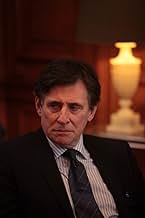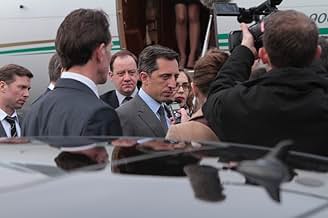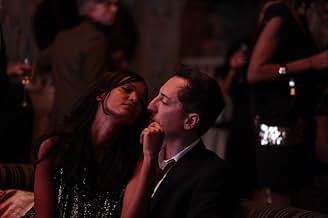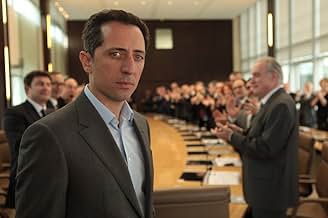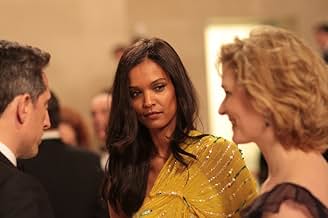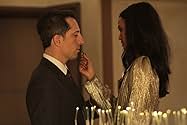PUNTUACIÓN EN IMDb
6,5/10
5,7 mil
TU PUNTUACIÓN
El recién nombrado director ejecutivo de un banco de inversión europeo gigante, trabaja para mantener su poder cuando una empresa estadounidense de fondos de cobertura intenta comprar su emp... Leer todoEl recién nombrado director ejecutivo de un banco de inversión europeo gigante, trabaja para mantener su poder cuando una empresa estadounidense de fondos de cobertura intenta comprar su empresa.El recién nombrado director ejecutivo de un banco de inversión europeo gigante, trabaja para mantener su poder cuando una empresa estadounidense de fondos de cobertura intenta comprar su empresa.
- Dirección
- Guión
- Reparto principal
- Premios
- 1 premio y 2 nominaciones en total
Reseñas destacadas
LE CAPITAL, (French) director Costa-Gavras, starring Gad Elmaleh, with Gabriel Byrne. Viewed at the 2013 Los Angeles Film Festival. Costa-Gavras' "Le Capital" is extremely glossy (in the good sense of the word) and an extremely penetrating high-end study of the workings of international Banking Conglomerates, in short, another typical Costa-Gavras exposé of the evils around us that run our lives without our realizing it.
At the beginning of the film the powerful head of a gigantic French investment bank, Le Phenix, collapses on a golf course and is diagnosed with terminal cancer "of the balls" (says the subtitle) --i.e., the testicles. With the implication that financial power mongers have to trade in sexual potency for financial power we have the first hint of the implicit satire to come.
The moribund CEO, passing over old cronies and more obvious candidates for the post he is about to vacate, hand picks a company nobody, a young scholarly banker, Marc Tourneuil, to the position of president thinking he will be easily manipulated during a temporary transition period.
Marc, played forcefully by handsome Moroccan born actor Gad Elmaleh, (Casablanca, 1971) turns out to be nobody's patsy, starts firing people right and left, and is soon running the bank for his own personal gain with the old timers plotting fecklessly against him. He gets involved in a multinational hostile takeover scheme masterminded remotely over office television by a sinister smooth talking Englishman (Gabriel Byrne). On the way in a complex effort to destroy him he is set up with a slinky black supermodel (apparently modeled on obstreperous English supermodel Naomi Campbell) who gives him a hard time in London and Tokyo before he finally has to rape her in a stretch limo in New York to gratify his methodically frustrated lust.
At the very end he finesses all the insiders trying to double cross him by threatening to expose the whole deal which will send them all to jail for insider trading. The deal in question has forced the collapse of Phenix and the creation of a new successor entity. At the foundation board meeting where Tourneuil is of course named the new CEO he announces that as their own "Robin du Bois" (Robin Hood) he will continue to rob the poor so that they can get even richer. Wild cheering goes up all around the table as actor Elmaleh turns to the camera and tells us in the audience directly that this will keep going on as long as we let it go on. Perhaps not the most subtle way to end this awesome tale of financial exploitation and greed at the highest levels, but maybe subtlety is not enough to wake us up.
The real meat of the film is the brilliant way in which Gavras presents the life styles of the super-greedy rich both in the work place and in their social life. For one party scene he apparently rented the entire sculpture foyer of the Louvre, as realistically lavish a party as has ever been seen on screen. All the other scenes follow suite in this typically excellent Costa Gavras mise-en-scene, a visual pleasure all the way and a heady thriller to boot.
"Le Capital" was not a big hit in France when released in November and was met with mixed reviews on IMDb and elsewhere, but since Americans do not have the same expectations as the French "Le capital" may enjoy a better reception here than it had on home ground. Gad Elamleh, for example, is far better known in France as a stand up comedian than a movie actor and his interpretation of banker Marc Tourneuil has been called unrealistic, but to an American audience that has never seen him before he will come across as quite convincing -- a handsome cad you end up rooting for because the other people he is up against are so much more evil and disgusting than he is. If anybody out there thinks that Costa Gavras has "lost it" at age eighty (as some have said) I would say they have another thought coming. In any case, having Consantine Costa Gavras visit the City of Angels to present his latest film was a singular feather in the hat of Film Independent.
"Le Capital" will go on general release in this country in October and then we shall see what people here have to say.
At the beginning of the film the powerful head of a gigantic French investment bank, Le Phenix, collapses on a golf course and is diagnosed with terminal cancer "of the balls" (says the subtitle) --i.e., the testicles. With the implication that financial power mongers have to trade in sexual potency for financial power we have the first hint of the implicit satire to come.
The moribund CEO, passing over old cronies and more obvious candidates for the post he is about to vacate, hand picks a company nobody, a young scholarly banker, Marc Tourneuil, to the position of president thinking he will be easily manipulated during a temporary transition period.
Marc, played forcefully by handsome Moroccan born actor Gad Elmaleh, (Casablanca, 1971) turns out to be nobody's patsy, starts firing people right and left, and is soon running the bank for his own personal gain with the old timers plotting fecklessly against him. He gets involved in a multinational hostile takeover scheme masterminded remotely over office television by a sinister smooth talking Englishman (Gabriel Byrne). On the way in a complex effort to destroy him he is set up with a slinky black supermodel (apparently modeled on obstreperous English supermodel Naomi Campbell) who gives him a hard time in London and Tokyo before he finally has to rape her in a stretch limo in New York to gratify his methodically frustrated lust.
At the very end he finesses all the insiders trying to double cross him by threatening to expose the whole deal which will send them all to jail for insider trading. The deal in question has forced the collapse of Phenix and the creation of a new successor entity. At the foundation board meeting where Tourneuil is of course named the new CEO he announces that as their own "Robin du Bois" (Robin Hood) he will continue to rob the poor so that they can get even richer. Wild cheering goes up all around the table as actor Elmaleh turns to the camera and tells us in the audience directly that this will keep going on as long as we let it go on. Perhaps not the most subtle way to end this awesome tale of financial exploitation and greed at the highest levels, but maybe subtlety is not enough to wake us up.
The real meat of the film is the brilliant way in which Gavras presents the life styles of the super-greedy rich both in the work place and in their social life. For one party scene he apparently rented the entire sculpture foyer of the Louvre, as realistically lavish a party as has ever been seen on screen. All the other scenes follow suite in this typically excellent Costa Gavras mise-en-scene, a visual pleasure all the way and a heady thriller to boot.
"Le Capital" was not a big hit in France when released in November and was met with mixed reviews on IMDb and elsewhere, but since Americans do not have the same expectations as the French "Le capital" may enjoy a better reception here than it had on home ground. Gad Elamleh, for example, is far better known in France as a stand up comedian than a movie actor and his interpretation of banker Marc Tourneuil has been called unrealistic, but to an American audience that has never seen him before he will come across as quite convincing -- a handsome cad you end up rooting for because the other people he is up against are so much more evil and disgusting than he is. If anybody out there thinks that Costa Gavras has "lost it" at age eighty (as some have said) I would say they have another thought coming. In any case, having Consantine Costa Gavras visit the City of Angels to present his latest film was a singular feather in the hat of Film Independent.
"Le Capital" will go on general release in this country in October and then we shall see what people here have to say.
I have seen the posters. Gad Elmaleh and Costa Gavras? Well, Costa Gavras directed nobodies like Ion Caramitru, so why not a stand up comedy man? Than I have read the reviews. The world is not like that, they say.
I have watched the movie. Maybe there are a bit too many characters on screen. I can say that of all of Costa Gavras' movies I have seen so far. But the story is good. And it's the best business-themed movie I have seen.
So what I can tell you is go see the movie and find for yourself if you like it. Just keep in mind this is not a reality TV show about white collar crime. Maybe it's true that the television has a strong impact on the way audiences perceive the big screen stories.
Contact me with Questions, Comments or Suggestions ryitfork @ bitmail.ch
I have watched the movie. Maybe there are a bit too many characters on screen. I can say that of all of Costa Gavras' movies I have seen so far. But the story is good. And it's the best business-themed movie I have seen.
So what I can tell you is go see the movie and find for yourself if you like it. Just keep in mind this is not a reality TV show about white collar crime. Maybe it's true that the television has a strong impact on the way audiences perceive the big screen stories.
Contact me with Questions, Comments or Suggestions ryitfork @ bitmail.ch
If there is one message that the movie is trying to communicate to its audience it's the above title.
There are of course reviews that point out the alleged likeliness of this film with movies like "Wall Street" usually concluding "that there is nothing new to see". Under closer examination however, any similarities between the two films go only skin-deep and can only be considered superficial. There are fundamental differences between these two movies because they represent two different approaches and evaluations of the same issue and which one hits home is up for you to decide. And thats because "Wall Street" focuses on the seducing power and aloofness of a loan shark that acts as a money fueled lone wolf, as opposed to the naiveness of a young rookie which is slow to disillusion himself about his own actions while he's getting carried away (but eventually comes out on top etc). The caveat of such scenarios is in that they constantly, silently and almost purposefully marginalize the inherent, all consuming, self-perpetuating environment and ill-conceived culture that money in and all by itself creates, even for "the winners of the game".
La Capital on the other hand has none of the above shortcomings when it comes to describing the black hole lurking deep into the very foundations of our culture: Money. It's a film about attitudes and value systems across the board, with a scenario that's free of cliché good-guy-vs-bad-guy dualities and with the courageous nerve to "pull no punches" sparing its viewer from having to suffer another stereotypical "happy ending" made-in-Hollywood (has elements of it but still its not "right into your face").
Finally, I would just like to add that, all in all, Mr Gavras is right in that there will come a time in the not so distant future ... A time in which, among other things, our western culture will look back to the contemporary intellectuals and artists to examine which ones did of their duty in terms of articulating the public opinion, bringing the spotlight on the machinations of the financial system and the corrosive effects that money in and all by itself has both on our societies as a whole, in our own micro-worlds and those of our acquaintances as well as our own fragile, individual psyches. And when this time comes I think that the memory of both Mr Gavras and those that stood by him in this and similar projects will be, if not exalted, then at the very least spared from the outrage of the dystopian poverty-striken masses.
There are of course reviews that point out the alleged likeliness of this film with movies like "Wall Street" usually concluding "that there is nothing new to see". Under closer examination however, any similarities between the two films go only skin-deep and can only be considered superficial. There are fundamental differences between these two movies because they represent two different approaches and evaluations of the same issue and which one hits home is up for you to decide. And thats because "Wall Street" focuses on the seducing power and aloofness of a loan shark that acts as a money fueled lone wolf, as opposed to the naiveness of a young rookie which is slow to disillusion himself about his own actions while he's getting carried away (but eventually comes out on top etc). The caveat of such scenarios is in that they constantly, silently and almost purposefully marginalize the inherent, all consuming, self-perpetuating environment and ill-conceived culture that money in and all by itself creates, even for "the winners of the game".
La Capital on the other hand has none of the above shortcomings when it comes to describing the black hole lurking deep into the very foundations of our culture: Money. It's a film about attitudes and value systems across the board, with a scenario that's free of cliché good-guy-vs-bad-guy dualities and with the courageous nerve to "pull no punches" sparing its viewer from having to suffer another stereotypical "happy ending" made-in-Hollywood (has elements of it but still its not "right into your face").
Finally, I would just like to add that, all in all, Mr Gavras is right in that there will come a time in the not so distant future ... A time in which, among other things, our western culture will look back to the contemporary intellectuals and artists to examine which ones did of their duty in terms of articulating the public opinion, bringing the spotlight on the machinations of the financial system and the corrosive effects that money in and all by itself has both on our societies as a whole, in our own micro-worlds and those of our acquaintances as well as our own fragile, individual psyches. And when this time comes I think that the memory of both Mr Gavras and those that stood by him in this and similar projects will be, if not exalted, then at the very least spared from the outrage of the dystopian poverty-striken masses.
Let's continue to rob the poor and make the rich richer!" this is what about the modern day banking and financing (undre)world, banks are just like Mafia, bankers Mafiosos, banks' CEO in private jet doing country hopping, hiring retired cop to do the dirt-digging and trashcan/dumpster diving jobs, committing some adultery flirting with high priced model- hooker, back-stabbing while self defense, behind the door deals, estranged to parents, wives, kids, fence off hostile takeover, firing the employees as many as possible, no gender and age are safe, laying off more, the stockholders will be happier and the stock will be rocketing. so, indeed "money is not a tool but a master, serving him well and he'll reward you generously". so let's continue to rob the poor blind and serve the rich loyally. what a great movie, very tense and thrilling, great montage, lot of exotic locations in different countries. this is a very nicely done movie, quite worth watching.
Basically good, sympathetic, or at least, interesting characters, you can relate to and care for, encounter obstacles, have to struggle for a while, but ultimately find their way through an unfriendly or simply indifferent world. We all love this type of films. "Capital" is emphatically not one of those, but is nevertheless worthy of attention.
There is at least one character, however, who has not lost her moral compass, and still has some, albeit minuscule weight in the film: the wife of the main protagonist, a former economics professor, and now an ambitious CEO of a leading French bank. Her pull on her husband, however, is only marginally stronger than the one that his extended family, of apparently modest means, has on him. He has feelings for her, as well as for his parents, but those simply cannot compare in intensity to the thrill of money. He is a man who understands "the way the world functions", as he is not shy to explain when questioned. It is a game, in which, typically, rich get richer and poor get poorer, but the reverse is not impossible, as we are told, only improbable. He is cool, calculated, unemotional player, consciously going for high stakes. Just like the others, towards him often inimical characters, who he does not blame for their repugnant behaviour, although certainly would not mind occasionally smashing their heads onto hard surfaces nearby. Of course, we understand that he could not have possible been any different and still belong to the top executive branches of the financial world.
Costa Gavras made his name in the genre of international political thriller, picking his subjects to be the most promising themes for such a film at a given time. It is already telling that he chose the world of high finance, and not of politics, as the most relevant field today. Indeed, the main character is addressed always as "the president", and he is treated as such by everybody he meets. He clearly lives in an entirely different world from the majority of even western, relatively well-off humanity, and his decisions, although made explicitly and exclusively for the benefit of the few, indeed affect, thousands of ordinary mortals. The bank that he directs, and pretty much all the interiors he ever dwells in do not fall far behind many European royal palaces. His world is the world of excess, but in his book it should be unapologetically so.
There is a hint in the film of a possible difference between the old European, and the new aggressive, American business attitudes, that may exist only on the surface. American bankers that we meet maybe cannot pronounce Modigliani's name correctly, but they understand perfectly that their French counterparts are just as greedy, and motivated by the same basic predatory impulses, as they are. As the main character says on one occasion, almost defending his adversaries across the Atlantic: "They are just businessman, like us". The difference seems to be only that the French operate from the high-ceiling, well decorated, old world Parisian buildings, whereas their American partners for their machinations prefer flashy yachts and skyscrapers.
The film certainly lacks the depth and the emotion of the very best Gavras' works, such as "Z" or the "Missing", but it functions well at the level of well written, competently shot, and expertly directed financial drama. It is an insightful, if not too original, commentary on today's state of affairs which to many will ring painfully true. There are also some fairly obvious flaws: the parallel thread with the "super model" that the main hero relentlessly pursues is rather stereotypical, and her attitude towards him appears far-fetched. It would have served the story's development better if the relationship with the multi-dimensional French female employee from London's office was introduced earlier and then further developed. This could have added some intellectual and emotional depth to the main character, beyond what was this way left only sketched. These comments notwithstanding, the film presents an entertaining and informative look at the dynamics of the modern world's new nobility.
There is at least one character, however, who has not lost her moral compass, and still has some, albeit minuscule weight in the film: the wife of the main protagonist, a former economics professor, and now an ambitious CEO of a leading French bank. Her pull on her husband, however, is only marginally stronger than the one that his extended family, of apparently modest means, has on him. He has feelings for her, as well as for his parents, but those simply cannot compare in intensity to the thrill of money. He is a man who understands "the way the world functions", as he is not shy to explain when questioned. It is a game, in which, typically, rich get richer and poor get poorer, but the reverse is not impossible, as we are told, only improbable. He is cool, calculated, unemotional player, consciously going for high stakes. Just like the others, towards him often inimical characters, who he does not blame for their repugnant behaviour, although certainly would not mind occasionally smashing their heads onto hard surfaces nearby. Of course, we understand that he could not have possible been any different and still belong to the top executive branches of the financial world.
Costa Gavras made his name in the genre of international political thriller, picking his subjects to be the most promising themes for such a film at a given time. It is already telling that he chose the world of high finance, and not of politics, as the most relevant field today. Indeed, the main character is addressed always as "the president", and he is treated as such by everybody he meets. He clearly lives in an entirely different world from the majority of even western, relatively well-off humanity, and his decisions, although made explicitly and exclusively for the benefit of the few, indeed affect, thousands of ordinary mortals. The bank that he directs, and pretty much all the interiors he ever dwells in do not fall far behind many European royal palaces. His world is the world of excess, but in his book it should be unapologetically so.
There is a hint in the film of a possible difference between the old European, and the new aggressive, American business attitudes, that may exist only on the surface. American bankers that we meet maybe cannot pronounce Modigliani's name correctly, but they understand perfectly that their French counterparts are just as greedy, and motivated by the same basic predatory impulses, as they are. As the main character says on one occasion, almost defending his adversaries across the Atlantic: "They are just businessman, like us". The difference seems to be only that the French operate from the high-ceiling, well decorated, old world Parisian buildings, whereas their American partners for their machinations prefer flashy yachts and skyscrapers.
The film certainly lacks the depth and the emotion of the very best Gavras' works, such as "Z" or the "Missing", but it functions well at the level of well written, competently shot, and expertly directed financial drama. It is an insightful, if not too original, commentary on today's state of affairs which to many will ring painfully true. There are also some fairly obvious flaws: the parallel thread with the "super model" that the main hero relentlessly pursues is rather stereotypical, and her attitude towards him appears far-fetched. It would have served the story's development better if the relationship with the multi-dimensional French female employee from London's office was introduced earlier and then further developed. This could have added some intellectual and emotional depth to the main character, beyond what was this way left only sketched. These comments notwithstanding, the film presents an entertaining and informative look at the dynamics of the modern world's new nobility.
¿Sabías que...?
- PifiasIn a dinner scene towards 67 minutes into the film, the liquid level in a bottle in front of Marc Tourneuil keep on changing between shots.
- Citas
L'oncle Bruno: Your bank makes money and you lay people off. How do you cope?
Selecciones populares
Inicia sesión para calificar y añadir a tu lista para recibir recomendaciones personalizadas
- How long is Capital?Con tecnología de Alexa
Detalles
Taquilla
- Recaudación en Estados Unidos y Canadá
- 101.700 US$
- Fin de semana de estreno en EE. UU. y Canadá
- 22.400 US$
- 27 oct 2013
- Recaudación en todo el mundo
- 4.822.849 US$
- Duración1 hora 54 minutos
- Color
- Mezcla de sonido
- Relación de aspecto
- 2.35 : 1
Contribuir a esta página
Sugerir un cambio o añadir el contenido que falta

Principal laguna de datos
By what name was El capital (2012) officially released in India in English?
Responde





